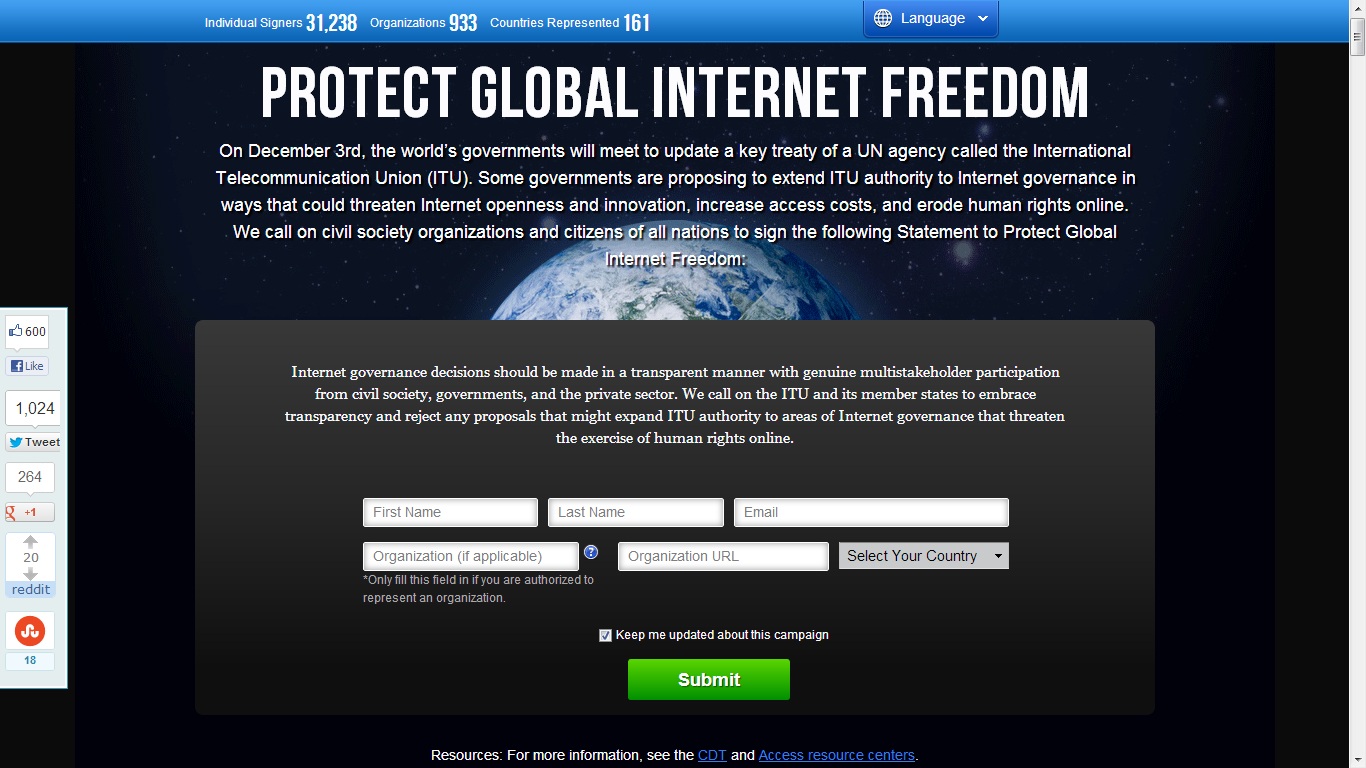Debate over Internet’s fate to light up in Dubai
By Gabey Goh November 27, 2012
- A review of the 1988 International Telecommunications Regulations (ITRs) treaty slated to begin on Dec 3 in Dubai
- Concerns raised by civil society and companies over the negative ramifications of a revised treaty
 THE fate of the Internet and how it is governed is set to take the global stage on Dec 3 when the United Nation's 193-nation International Telecommunications Union (ITU) meets in Dubai for the World Conference on International Telecommunication (WCIT) to review a 1988 treaty.
THE fate of the Internet and how it is governed is set to take the global stage on Dec 3 when the United Nation's 193-nation International Telecommunications Union (ITU) meets in Dubai for the World Conference on International Telecommunication (WCIT) to review a 1988 treaty.
The International Telecommunications Regulations (ITRs) treaty governs how telephone calls and other communications traffic are exchanged internationally and the upcoming review is being conducted in an effort to update and revise it for relevance in a drastically changed and connected world.
Under the existing framework, the Internet has no centralized governance in either technological implementation or policies for Internet access and usages, allowing considerable freedom to communicate, innovate and participate.
The ITU has said a new treaty was needed to ensure "the free flow of information around the world, promoting affordable and equitable access for all and laying the foundation for ongoing innovation and market growth".
However a new proposal for the ITRs to govern the Internet's role is fast gaining attention as worldwide concerns grow over the potential impact of the revised treaty which could increase Internet costs and violate consumers' privacy rights.
Among the issues on the WCIT agenda are ideas to battle Internet spam and fraud. But also included in the stack of over 1,300 proposals are potential hot-button items that opponents believe could be used by in places such as Iran and China to justify their crackdowns on bloggers and other Web restrictions.
In reports, US officials and companies have sounded the alarm about such proposals, which would expand the scope of the treaty so it shifts from regulating telecommunications networks to regulating the exchange of information on the Internet.
The European Telecommunications Network Operators, an association of 50 operators of 35 countries, also wants the ITU to subject Internet content providers to a rule which would authorize Internet service providers (ISPs) to charge them rates proportionate to the bandwidth their content consumes.
This proposed move would make providers of services such as YouTube, Facebook, Amazon and iTunes pay a substantial amount to the ISPs for their services, part of which might be passed on to the consumers.
The final decision, which would lead to a revision of the ITRs, would be made through a vote of the ITU member states at the conference.
Make some noise
 In a bid to raise awareness and garner the support of the global Internet community over what has been described as a 'closed-door meeting' between selected stakeholders, two major movements have sprung up in recent months.
In a bid to raise awareness and garner the support of the global Internet community over what has been described as a 'closed-door meeting' between selected stakeholders, two major movements have sprung up in recent months.
First there is coalition led by Canada-based OpenMedia called Protect Internet Freedom, which is representing over 160 countries.
In an article on its website, the organization’s online community facilitator Stephen Ludlow wrote: “Under the ITU’s governance, censorship laws introduced by one country would require all other participating countries to adopt those same restrictions, meaning that Internet openness and innovation would be threatened as a result."
"And from what we know of the negotiations around the ITU, we may be looking at a future where the countries with the worst Internet restrictions would be the ones setting the standards for the rest of the world.”
In Malaysia, along with Dazzlepod and FinchVPN, the Center for Independent Journalism (CIJ) has been listed as a supporting member of the coalition.
In an email interview, Masjaliza Hamzah, CIJ’s executive officer, told Digital News Asia (DNA) that the review will have an impact on policies and standards that could affect the exercise of human rights on the Internet.
“Government representatives have full participation in the ITU, unlike civil society, and if the ITRs treaty also includes the Internet, this is yet another layer where policy and standards are discussed without civil society's direct input,” she said.
Masjaliza added that currently, civil society groups at least have some measure of access in the Internet's decentralized model of governance.
“The ITU's expertise is in telecommunications policy and regulation, so it should just stick to that mandate rather than expand it,” she said.
When asked if the CIJ had any major plans to push the campaign, Masjaliza said the CIJ currently does not have the resources to do so in a big way.
“We do what little we can, by promoting it on social media, and urging Malaysia-based organizations to sign. It always feels like an uphill battle, but civil society needs to make their stand on this known,” she added.
 A call to action
A call to action
The second major campaign against the proposed changes to the ITRs is being spearheaded by Google.
The search giant began actively promoting its Take Action campaign early last week, urging Internet users to sign up for more details and include their voice in support of the free and open Internet.
The campaign’s manifesto reads: “A free and open world depends on a free and open Internet. Governments alone, working behind closed doors, should not direct its future. The billions of people around the globe who use the Internet should have a voice.”
According to Google, the independence of the Web is being increasingly threatened by governments, with 42 countries currently filtering content and in the past two years 19 new laws have been introduced which threaten Internet freedom.
A spokesman for Google said: “More than 100 organizations from 50+ countries have raised concerns about an upcoming closed-door meeting in December in Dubai, where governments will consider proposals to increase regulation and censorship of the Internet.”
“People can learn more about the issue on our website – and if they choose to do so, can pledge their support for a free and open Internet.”
However, the campaign’s assertion that only a handful of stakeholders, namely government entities, have a say in the ITRs proceedings, has been contested by the ITU.
In a blog post by the organization’s Head of Communications and Partnership Promotion Division, Paul Conneally wrote that Google “incorrectly stated on its official website that governments alone, working behind closed doors, should not direct the Internet’s future.”
Conneally said the so-called closed-door meeting is however inclusive of 193 national delegations, in addition to private sector companies and civil society organizations registered to attend in large numbers.
The post also pointed out that the United States, where Google itself is headquartered, has confirmed more than 125 people in its delegation, with a large majority of these delegates representing the private sector and civil society.
“It is interesting to note that Google representatives are part of the United States delegation,” he added.
The organization firmly believes that a revised treaty can help harness the power of ICTs (information and communications technologies) to deliver social and economic benefits in every nation on earth, including across every sector. ITU’s goal is to continue enabling the Internet, as it has done since the Internet’s inception.
With less than a week to go before the WCIT begins in Dubai, the campaign to garner global support against it continues with all eyes on the possible proposals which will emerge from the 11-day meeting and its potential consequences.
Up Next: A deeper dive into the issues surrounding the upcoming review of the ITRs with Jeremy Malcolm, Consumers International's project coordinator for Intellectual Property and Communications


